Rocky Revisited: Showing Some Love for the Sequels
 Since the Italian Stallion first appeared on screen in 1976, Rocky Balboa’s cinematic story has become a firm part of the pop culture, not just in America, but around the world. And the tropes have been emulated and parodied many times over the years in other films, television and other media. It seems that everyone knows that theme music, the training montage, the steps of the Philadelphia Museum of Art.
Since the Italian Stallion first appeared on screen in 1976, Rocky Balboa’s cinematic story has become a firm part of the pop culture, not just in America, but around the world. And the tropes have been emulated and parodied many times over the years in other films, television and other media. It seems that everyone knows that theme music, the training montage, the steps of the Philadelphia Museum of Art.
Like all great films about sports, Rocky isn’t really about the sport, but about life itself. It’s about people, and how they relate to one another. It’s also a very touching love story, one of the best in all cinema as far as I’m concerned.
The Rocky formula is about to be revisited for a new generation with Ryan Coogler’s Creed. In this new film, Rocky is in the trainer/manager role, honing the skills of the illegitimate son of his late rival-turned-friend, Apollo Creed.
Though initially reluctant when I first heard about it, seeing the trailer for Creed won me over, as the grit and grime from the original Rocky is visually written all over this film. In fact, my anticipation prompted me to revisit the original Rocky and its five sequels. They are among my favorite films of all time. Yes, I used the plural.
The sequels in particular have been fodder for comedians and pop culture critics for years, mainly jabbing at their purported overabundance. The Simpsons made a particularly funny gag, with Bart using the titles to quickly recall a school lesson about Roman numerals:
“Rocky V plus Rocky II equals Rocky VII: Adrian’s Revenge!”
I may be in the minority, but each of the Rocky films serve a purpose. It is true that they’re not a good as the original, and parts of them may be unnecessary and overly sentimental, but they are good films overall.
Rocky is just one of those characters audiences love spending time with. At the very least, the sequels give us more insight into the kind of man Rocky is, as well as add layers to the relationships he maintains with the other characters.
Rocky II (1979)
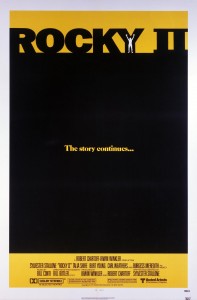 While Rocky is indeed one of the best films ever made, I have always felt that it’s only half of a complete story. This film, the first Rocky to be both written and directed by star Sylvester Stallone, brings the story full circle. Beginning literally at the end of the first film, Apollo Creed wants to prove that the Italian Stallion’s ability to go the distance with the champ was just a fluke, and challenges Rocky to a rematch.
While Rocky is indeed one of the best films ever made, I have always felt that it’s only half of a complete story. This film, the first Rocky to be both written and directed by star Sylvester Stallone, brings the story full circle. Beginning literally at the end of the first film, Apollo Creed wants to prove that the Italian Stallion’s ability to go the distance with the champ was just a fluke, and challenges Rocky to a rematch.
The motivations between the two men couldn’t be more different. Apollo taunts and teases Rocky into a rematch, and simply wants to fight him for heal his own vanity – a character flaw that will haunt Apollo through the entire series.
Rocky is a genuinely nice guy, and doesn’t even have a bad word to say about Apollo, despite Apollo’s trash-
In the end, Apollo eats a big helping of humble pie, and Rocky gets a real win – something the audience had been hoping he would get.
“Pride goes before destruction, a haughty spirit before a fall.” Proverbs 16:18
I love this movie because of what it says about pride and its consequences. Apollo doesn’t learn his lesson until the end of the film, and he’s really the only one of Rocky’s rivals who truly learns and repents onscreen. More on that later.
This film brings to mind the line Bane delivered to Batman in Christopher Nolan’s The Dark Knight Rises: “Victory has defeated you.” Again written and directed by Stallone, the story finds Rocky at the pinnacle of success. However, the heart and drive he had been famous for was diminished by the comfort at the top. A defeat at the hands of the young, hungry and cruel challenger, Clubber Lang, forces Rocky to rediscover his desire for fighting.
I enjoy the dramatic irony of this film in turning the tables on Rocky. Apollo, now humbled and wiser, offers to be Rocky’s manager. The two once-rivals become friends, and eventually help each other become more than they could separately.
Rocky III‘s strongest theme is one of drive. Something worth doing is always going to be difficult, but we must have the desire to see it through. Apollo called it the “eye of the tiger.”
Even relationships with people require effort on our part. Our relationship with God Himself is something that requires effort.
Rocky IV (1985)
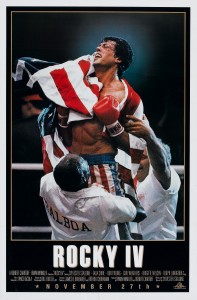 Rocky’s story is uniquely American, and the character is considered an American symbol. In Rocky II, he’s joined by a bunch of children and teenagers on his training run – a symbolic emphasis that he is one of us and we can see ourselves in him. It comes as no surprise that in this fourth installment, he symbolizes the nation itself.
Rocky’s story is uniquely American, and the character is considered an American symbol. In Rocky II, he’s joined by a bunch of children and teenagers on his training run – a symbolic emphasis that he is one of us and we can see ourselves in him. It comes as no surprise that in this fourth installment, he symbolizes the nation itself.
Rocky finds himself up against a mountain of a man named Ivan Drago – a Soviet boxer who had beaten Apollo Creed to death, literally. Rocky’s character comes through, as he doesn’t want to kill the Russian, but beat him in the ring. The mountain slowly crumbles, as Rocky takes Drago’s punishing blows and delivers some of his own – while the Soviet crowd slowly starts rooting for the American.
This film was made as the Cold War was winding down, and is filled with interesting symbolism of the conflict. Drago is a callous automaton, scientifically engineered into the “ultimate fighter.” Rocky trains individually with improvised equipment. There is something more to Rocky than science can explain, which brings up themes about the dangers of over-reliance on technology.
The film also has something to say about the sometimes over-confidence of American culture, as represented by Apollo’s garish and showy display before the Drago fight.
What really makes Rocky IV my third-favorite in the franchise is Rocky’s speech after dispatching Drago:
“…If I can change, and you can change, then everybody can change.”
Rocky holds no quarrel with Drago or the Soviet audience, and he shows them respect. He takes the opportunity to say something heartfelt, and true. We all can repent and change our wrongheaded ways. In fact, we have a Savior who can truly help us do just that.
This film is probably the weakest of the series, which is interesting because original Rocky director John Avildsen climbed back in the chair for this one. However, this film still has importance.
Because of financial troubles, Rocky is forced to return to his roots and move back to the old neighborhood in Philly. Seeking a new outlet, he begins to live vicariously through a hungry young fighter named Tommy Gunn.
It is in this film that Rocky realizes how much his family means to him. He neglects his son to mentor Tommy, pinning all his hopes and dreams on the young fighter. But Tommy lacks the heart that made Rocky who he is, and is corrupted by the lure of money and power. The apprentice eventually challenges Rocky, leading to an unconventional ending to a Rocky movie: a street fight.
“What good is it for someone to gain the whole world, but forfeit their soul?” Mark 8:36
Like Clubber Lang in Rocky III, Tommy Gunn exemplifies what could have happened to Rocky had he not had the strength of character as a young man. Rocky realizes that he’s going down Apollo’s fatal path – putting all of his stock and self-worth into something that doesn’t last. Rocky understands by the end of the move that even though he doesn’t have much material wealth anymore, he has his family and that’s all that matters.
Rocky Balboa (2006)
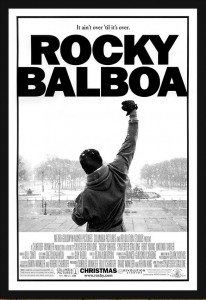 This is my favorite Rocky sequel. There has never been a more beautiful, satisfying and succinct final chapter of a film film franchise than this one. It is one of the most heartfelt entries into the series, full of depth and emotion. Stallone once again writes and directs, and gives one of his best performances, period.
This is my favorite Rocky sequel. There has never been a more beautiful, satisfying and succinct final chapter of a film film franchise than this one. It is one of the most heartfelt entries into the series, full of depth and emotion. Stallone once again writes and directs, and gives one of his best performances, period.
In the previous films, Rocky fought seemingly insurmountable opponents. In this film, he’s attempting to fight something impossible: life and aging. With Adrian dead from cancer years earlier, Rocky is directionless and full of grief. When an opportunity comes along to rekindle his fighting spirit, he jumps at the change despite the misgivings of his friends and son.
The theme to take away from this film is endurance – to be able to keep moving forward despite obstacles in our way. This is summed up in one of the best monologues from the series, or any movie for that matter.
We must also remember that Jesus said that we would have troubles in this world. But with His help, we must endure what the world throws at us (John 16:33).
The Rocky franchise is one of my favorite film series. Though some knock the sequels as being inferior or unnecessary, I see them as a solid continuation of an engaging story. The characters are wonderful and the themes really speak to me.
I’m very much looking forward to seeing Creed. If the early reviews are any indication, Creed should be a welcome addition to this wonderful franchise.


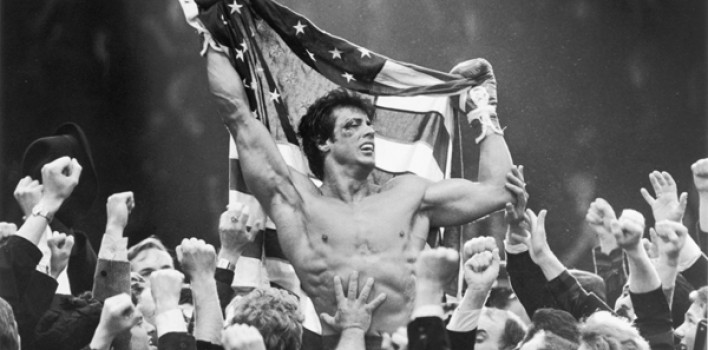
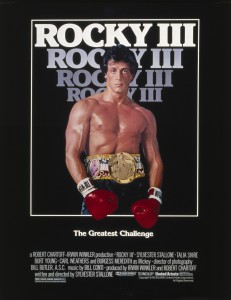
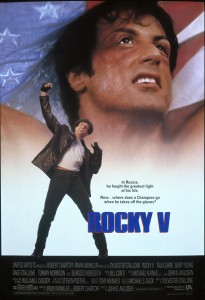


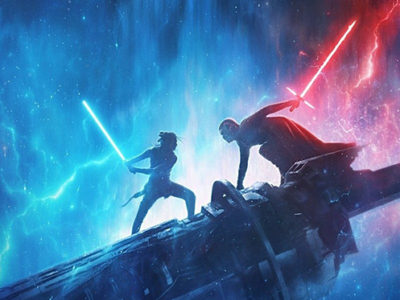


My favorites, in order… Rocky III, Rocky, Rocky II and Rocky Balboa (call it a tie), Rocky IV, Rocky V (the gap between IV and V is a wide one). Having just seen Creed, and with only a short time to reflect, I’m fighting the urge to put it at No. 1. Have you seen it yet?